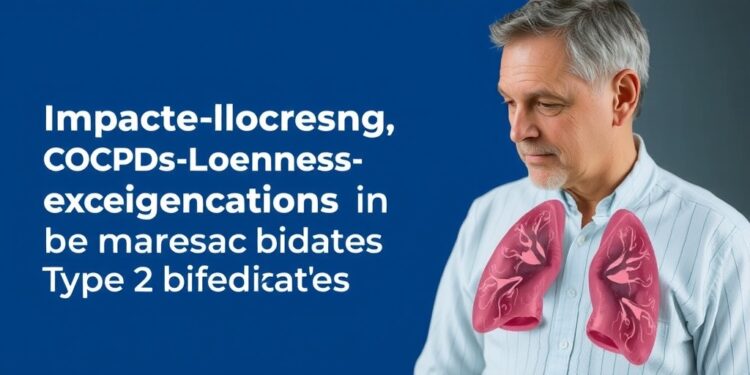Sodium-glucose cotransporter-2 (SGLT-2) inhibitors and glucagon-like peptide-1 receptor agonists (GLP-1RAs) are two classes of medication that have gained significant attention for their therapeutic benefits in managing type 2 diabetes. Recent findings from a comparative effectiveness research study shed new light on these drugs, particularly for patients suffering from both type 2 diabetes and chronic obstructive pulmonary disease (COPD). The implications of this study are crucial for clinicians tasked with prescribing appropriate glucose-lowering medications in such complex comorbid scenarios.
Chronic obstructive pulmonary disease is a progressive respiratory condition characterized by airflow limitation. For the millions of individuals worldwide affected by both type 2 diabetes and COPD, managing the symptoms while optimizing glycemic control poses a considerable challenge. The study in question indicates that the use of SGLT-2 inhibitors and GLP-1RAs is associated with a reduction in moderate or severe COPD exacerbations compared to dipeptidyl peptidase 4 inhibitors (DPP-4 inhibitors). This represents an important finding for respiratory health in patients with diabetes, opening new avenues for integrated treatment approaches.
SGLT-2 inhibitors function by preventing the reabsorption of glucose from the renal tubules, effectively promoting its excretion in urine. This not only aids in lowering blood sugar levels but also offers additional benefits such as weight loss and a reduced risk of cardiovascular events. On the other hand, GLP-1 receptor agonists enhance insulin secretion in response to meals, reduce glucagon release, and slow gastric emptying, thereby contributing to improved glycemic control and potential weight management. The mechanisms through which these medications operate may also have positive effects on pulmonary health, which merits further investigation.
The reduction in COPD exacerbations associated with SGLT-2 and GLP-1 medications raises critical questions about their mechanisms of action. While both classes are primarily designed to manage glucose levels, they may exert protective effects on lung function and inflammation. COPD exacerbations are often triggered by various factors including infections and environmental pollutants. The anti-inflammatory properties inherent in SGLT-2 inhibitors and GLP-1RAs may provide a protective buffer against these triggers. The study’s authors emphasize the importance of multisystemic engagement in therapeutic approaches for managing chronic diseases.
Beyond the immediate clinical implications, the research drives home the necessary quest for understanding drug interactions within multidimensional health scenarios. Patients with comorbid conditions often face polypharmacy, which complicates treatment regimens and increases the likelihood of adverse drug events. Hence, clinicians must take heed of the potential impacts of glucose-lowering agents not just on diabetes, but on concomitant conditions such as COPD. This study provides a strong evidence base for optimizing treatment choices that encompass long-term health outcomes.
Furthermore, ongoing research into the shared pathways between diabetes and respiratory diseases can pave the way for innovations in drug development. As new evidence emerges regarding the interplay of these disease states, the pharmaceutical industry is likely to respond with therapies that address both glycemic and respiratory control. This forward-thinking perspective inspires hope for better management strategies in the future.
This new research aligns with an ongoing narrative striving for a more integrated and holistic approach to chronic disease management. It is a clarion call for researchers and medical practitioners alike to consider the nuances of polypharmacy in patients with multiple chronic diagnoses. The responsiveness of SGLT-2 inhibitors and GLP-1RAs in lowering the risk of COPD exacerbations in diabetic patients offers a practical framework for developing innovative therapeutic models.
In conclusion, the findings of this study are significant not just for their immediate therapeutic implications, but also for the broader dialogue surrounding the treatment of chronic diseases in a multidimensional context. The potential of SGLT-2 inhibitors and GLP-1 receptor agonists to mitigate the risks associated with COPD exacerbations merits further exploration into their pathways, mechanisms, and long-term impacts on public health outcomes. The evolving narrative of integrating these treatment modalities is likely to enhance the quality of life for patients managing both diabetes and respiratory conditions.
As we continue to explore the intricate webs of chronic disease interactions, enlightening studies such as this one serve as vital tools to inform clinical guidelines and enhance patient care. The drive for research into dual-action medications will undoubtedly shape the future landscape of chronic disease management and foster a new era of personalized medicine.
Subject of Research: Effects of sodium-glucose cotransporter-2 inhibitors and glucagon-like peptide-1 receptor agonists on COPD exacerbations in patients with type 2 diabetes.
Article Title: Impact of SGLT-2 Inhibitors and GLP-1RAs on COPD in Type 2 Diabetes Patients
News Publication Date: October 2023
Web References: [Link to the study]
References: [Reference details]
Image Credits: [Image credits details]
Keywords: SGLT-2 inhibitors, GLP-1 receptor agonists, COPD, type 2 diabetes, chronic disease management, respiratory health, comparative effectiveness research, polypharmacy, integrated treatment approaches.
Tags: challenges in managing diabetes and COPDcomparative effectiveness of diabetes medicationsCOPD exacerbations and diabetes managementGLP-1 receptor agonists and COPDglucose-lowering medications for type 2 diabetesimpact of diabetes on chronic obstructive pulmonary diseaseintegrated treatment approaches for diabetes and COPDmanaging comorbidities in type 2 diabetesreducing COPD exacerbations with diabetes drugsrespiratory health in diabetes patientsSGLT-2 inhibitors benefits for respiratory healththerapeutic benefits of diabetes medications





